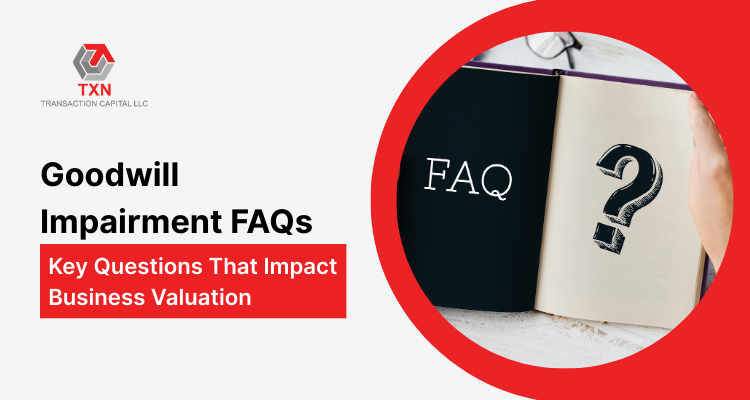Goodwill Impairment FAQs: Key Questions That Impact Business Valuation

Goodwill impairment can silently erode your company's value, trigger audit red flags, and shake investor confidence—often when you least expect it. Whether you're a startup founder, CFO, or business owner, understanding how goodwill impacts your business valuation is crucial for financial health and compliance.
This comprehensive guide answers the most critical questions about goodwill impairment and provides actionable insights to protect your business value.
What Is Goodwill and Why Does It Matter for Your Business?
Goodwill represents the premium paid when acquiring a business above its tangible net assets. This intangible asset captures elements like brand reputation, customer relationships, employee expertise, and expected synergies that make a company worth more than its books suggest.
Real-world example: When Company A purchases Company B for $10 million, but B's identifiable assets only total $7 million, the additional $3 million becomes goodwill on A's balance sheet.
Unlike other assets, goodwill doesn't depreciate over time. However, it must undergo annual impairment testing to ensure its recorded value remains accurate and defensible.
How Does Goodwill Impairment Impact Your Company's Financial Health?
Goodwill impairment occurs when an asset's fair market value drops below its recorded book value. This situation forces companies to write down the difference as a non-cash expense, directly affecting financial statements and investor perceptions.
The impact extends beyond accounting entries:
- Reduces net income and total assets
- Signals potential acquisition missteps or operational challenges
- Affects key valuation multiples like EV/EBITDA ratios
- Can trigger covenant violations or investor concerns
Smart business owners monitor goodwill health proactively rather than waiting for annual testing requirements.
What Events Trigger Mandatory Goodwill Impairment Testing?
Certain internal and external factors can signal that goodwill may no longer justify its carrying value. Recognizing these triggers early helps prevent surprise write-downs during audits.
Internal Triggering Events Include
- Declining financial performance in acquired business units
- Loss of major customers, key executives, or strategic partnerships
- Organizational restructuring or significant cost reduction initiatives
- Revised forecasts showing lower expected cash flows
- Changes in business strategy or market focus
External Market Triggers Include
- Economic downturns or industry-specific recessions
- Increased competition or disruptive technology threats
- Regulatory changes affecting operations or profitability
- Significant decline in stock price or market capitalization
- Changes in interest rates affecting discount rates
Companies must test for impairment immediately when these events occur, not just during annual reviews.
What's the Step-by-Step Process for Testing Goodwill Impairment?
The goodwill impairment testing process follows specific accounting standards designed to ensure accuracy and consistency across companies.
Step 1: Qualitative Assessment (Optional Under U.S. GAAP)
Companies can perform an initial "Step Zero" evaluation to determine if there's a greater than 50% likelihood of impairment. This preliminary assessment can save time and resources if impairment appears unlikely.
Step 2: Define the Testing Unit
- U.S. GAAP (ASC 350): Testing occurs at the reporting unit level—typically a business segment with independent financial reporting
- IFRS (IAS 36): Testing happens at the cash-generating unit (CGU) level—the smallest asset group generating independent cash flows
Step 3: Determine Fair Value Using Professional Methods
Professional valuers employ multiple approaches to estimate fair value:
- Income Approach: Discounted Cash Flow (DCF) modeling based on projected future earnings and capitalization of earnings methods
- Market Approach: Comparable company multiples and recent transaction data using guideline public company and guideline transaction methods
- Asset Approach: Adjusted net asset method and replacement cost analysis (rarely used for goodwill situations)
- Specialized Methods: Option Pricing Models (OPM) for complex capital structures and Backsolve Method for recent financing rounds
Step 4: Compare Values and Calculate Impairment
When carrying value exceeds fair value, the difference represents impairment loss. This amount cannot exceed the total goodwill recorded on the balance sheet.
Step 5: Record and Disclose Results
Impairment losses appear on income statements with detailed footnote disclosures explaining valuation methods, assumptions, and triggering events.
How Does Goodwill Impairment Affect Your Overall Business Valuation?
Goodwill write-downs create ripple effects throughout financial statements and valuation metrics that investors, lenders, and potential acquirers closely examine.
Direct Financial Statement Impacts
- Income Statement Effects: Impairment charges reduce net income, affecting earnings-based valuation multiples and potentially triggering debt covenant violations.
- Balance Sheet Changes: Lower total assets and reduced shareholders' equity impact book value calculations and asset-based valuation approaches.
- Cash Flow Considerations: While impairment doesn't affect operating cash flow directly, it may signal underlying operational issues requiring management attention.
Investor and Market Perceptions
Large or recurring goodwill impairments often signal:
- Poor acquisition decision-making or due diligence
- Management's inability to realize projected synergies
- Fundamental business model challenges
- Market positioning weaknesses
These perceptions can reduce valuation multiples and make future fundraising or exit opportunities more challenging.
Can Goodwill Impairment Be Reversed?
Both U.S. GAAP and International Financial Reporting Standards treat goodwill impairment as permanent and irreversible. Even if business conditions improve and fair value recovers, companies cannot restore previously written-down goodwill.
This conservative accounting approach protects stakeholders from volatile intangible asset valuations but emphasizes the importance of accurate initial assessments and ongoing monitoring.
The permanence of goodwill impairment makes professional valuation expertise essential during acquisitions and annual testing procedures.
What Are the Tax Implications of Goodwill Write-Downs?
Goodwill impairment creates complex tax considerations that vary based on how the original goodwill was acquired and structured.
Key Tax Considerations
- Deductibility: Impairment losses typically aren't tax-deductible unless goodwill resulted from taxable asset acquisitions rather than stock purchases.
- Deferred Tax Effects: Impairment may create or modify deferred tax assets and liabilities, requiring careful documentation and analysis.
- Documentation Requirements: Proper alignment between book and tax treatment requires detailed records supporting impairment decisions and calculations.
- IRC Section 197 Compliance: Companies must ensure impairment testing aligns with federal tax amortization rules for acquired intangibles.
Professional tax advice becomes essential when significant goodwill impairment occurs, particularly for companies with complex acquisition histories.
What Best Practices Ensure Accurate and Defensible Impairment Testing?
Successful goodwill impairment testing requires systematic approaches that satisfy auditors, regulators, and internal stakeholders while providing actionable business insights.
1. Establish Consistent Testing Protocols
- Annual Testing Schedule: Choose specific dates (often Q4 start) allowing sufficient time for year-end audit preparation and review.
- Triggering Event Monitoring: Implement quarterly reviews to identify potential impairment indicators before they become material issues.
- Documentation Standards: Maintain detailed records of assumptions, methodologies, discount rates, and comparable company selections.
2. Employ Multiple Valuation Approaches
Cross-validate DCF models with market-based multiples to ensure reasonable and supportable conclusions. Single-method approaches often fail audit scrutiny and may not capture market complexities.
3. Engage Professional Valuation Experts
Independent valuation firms bring credibility, technical expertise, and audit-readiness that internal teams often cannot provide. Look for professionals holding ABV®, ASA, CVA®, or MRICS credentials.
Real-World Examples: When Goodwill Impairment Goes Wrong
Learning from high-profile impairment cases helps business owners recognize warning signs and implement preventive measures.
1. Microsoft-Nokia ($7.6 Billion Write-Down)
Microsoft's 2014 Nokia handset acquisition quickly soured when smartphone market dynamics shifted. Within one year, declining sales and market share losses forced Microsoft to write off nearly the entire acquisition value, highlighting the importance of realistic market projections.
2. General Electric-Alstom ($22 Billion Impairment)
GE's power division acquisition faced unexpected energy market transitions toward renewable sources. Lower-than-projected returns and changing industry fundamentals led to one of corporate America's largest goodwill impairments.
3. Kraft Heinz Brand Impairment ($15.4 Billion)
Declining brand strength and reduced growth expectations for iconic brands like Kraft and Oscar Mayer forced massive goodwill write-downs in 2019, demonstrating how consumer preference shifts impact intangible asset values.
These cases underscore the critical importance of thorough due diligence, realistic projections, and ongoing post-acquisition monitoring.
When Should Your Company Hire Professional Valuation Services?
Certain situations demand independent professional expertise to ensure accurate, defensible goodwill impairment testing that satisfies all stakeholders.
Consider Professional Help When
- Triggering events indicate potential impairment risks
- Internal teams lack DCF modeling or market analysis expertise
- Audit-ready documentation and regulatory compliance are essential
- Objectivity and independence are crucial for credibility
- M&A transactions, IPO preparations, or investor fundraising are planned
- Complex capital structures or multiple business units complicate testing
Benefits of Professional Valuation Services
- Technical Expertise: Certified professionals understand nuanced valuation methodologies and current market conditions affecting specific industries.
- Audit Readiness: Professional reports include proper documentation, methodology explanations, and supporting analyses that satisfy auditor requirements and are trusted by Big 4 audit firms for financial reporting and tax audits.
- Regulatory Compliance: Expert valuers ensure testing meets ASC 350, IAS 36, and other applicable standards while supporting SEC and IRS requirements. Our reports are court-acceptable for litigation purposes and meet institutional investor standards.
- Strategic Insights?: Beyond compliance, professional valuations provide actionable insights for business planning, strategic decisions, and performance monitoring.
How Transaction Capital LLC Supports Your Goodwill Valuation Needs
At Transaction Capital LLC, we understand that goodwill impairment testing requires technical precision, regulatory compliance, and strategic business insight. Our comprehensive approach delivers solutions that protect your company's financial health while supporting long-term growth objectives.
Our Specialized Services Include
- Business Valuation Services: Complete enterprise and business unit valuations for impairment testing, M&A transactions, and strategic planning.
- Intangible Valuation: Detailed assessments of goodwill, intellectual property, and other intangible assets across diverse industries and business models.
- Gift & Estate Tax Valuation Services: Professional valuations for estate planning, gift tax compliance, and family business transitions.
- Fairness Opinions: Independent assessments supporting board decisions, shareholder communications, and transaction fairness evaluations.
Final Thoughts: Protecting Your Business Value Through Proactive Management
Goodwill impairment represents more than accounting complexity—it signals real business challenges that require strategic attention and professional expertise. Companies that monitor goodwill health proactively, implement robust testing procedures, and engage qualified professionals position themselves for sustained success.
Use this comprehensive guide to:
- Recognize early warning signs of potential impairment
- Implement systematic monitoring and testing procedures
- Ensure full compliance with applicable accounting standards
- Maintain strong relationships with investors, auditors, and stakeholders
- Make informed strategic decisions that protect and enhance business value
When intangible assets comprise significant portions of your company's value, professional management becomes essential for long-term success.
Schedule your professional goodwill valuation consultation with Transaction Capital LLC today. Our certified experts provide the expertise, documentation, and strategic insights needed to navigate complex valuation challenges while supporting your business objectives.
Frequently Asked Questions About Goodwill Impairment

Dr. Gaurav B.
Founder & Principal Valuer, Transaction Capital LLC
Specialist in IRS-Compliant 409A & Complex Valuation Matters
Dr. Gaurav B. is the Founder and Principal Valuer of Transaction Capital LLC, a valuation and financial advisory firm providing independent, standards-based valuation opinions for startups, growth-stage companies, and established enterprises.


